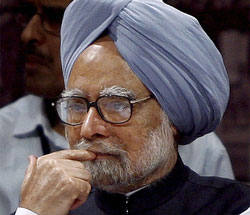
New Delhi, August 21: BJP today defended its decision to demand Prime Minister Manmohan Singh's resignation in the alleged irregularities in coal blocs allocation, saying it owes it to the people in the wake of "regular occurence" of scams and insisted it will continue to press for his removal.
"In both Houses of Parliament today, we demanded Prime Minister Manmohan Singh's resignation. We will continue to strongly press for it as the coal allocation issue is not an isolated incident.
The 2G spectrum issue, Commonwealth Games scam, public-private partnership issue of airports and now the coal blocks," Deputy Leader of BJP in Rajya Sabha Ravi Shankar Prasad told reporters.
He alleged these cases demonstrate that the Manmohan Singh government is one of "scam, shame, scandals, corruption and loot and that BJP is levelling these charges with all responsibility.
Claims by Congress of having taken action against corruption are "absolutely hollow", BJP charged. The party maintained that it was due to opposition pressure, media campaign and intervention of the judiciary that action was taken.
On coal allocation issue, BJP said Singh had held the Coal portfolio for five years since UPA came to power in 2004 and is hence responsible for the loss of revenue of Rs 1.86 lakh crore estimated by CAG.
He indicated BJP will continue to press for Singh's resignation in Parliament in the coming days.
"If scams keep happening with such regularity, we owe it to the people to demand the Prime Minister's resignation," Prasad said.
"This whole alibi of shifting the blame on states (on coal allocation) is completely untenable and motivated," Prasad said.
BJP also rubbished Congress' claim that the screening committee formed to look into the coal block allocations was opposed to auctions. Prasad said the decision has to get the assent of the PM and hence he is complicit.
Prasad said the decision to go for auction of coal blocks was taken in 2004 but it has not been implemented though eight years have passed.
The BJP leader said though the process did not start, the value of shares went up bringing "windfall gains" to those who were allocated the coal blocks.
Asked why BJP was not agreeing to a debate on coal allocation issue, the party maintained it does not bear the required results as discussions had taken place in Parliament on 2G spectrum issue, alleged involvement of then Finance Minister P Chidambaram in Aircel-Maxis deal and the Commonwealth Games scams but nothing much was done.
The main opposition is also unhappy about the manner in which some of the ruling party members of the Joint Parliamentary Committee are "not allowing" it to work effectively.
Earlier, Parliament's Public Accounts Committee had also faced a lot of opposition from the ruling party members when the body was discussing the CAG report on 2G spectrum.
This has firmed up the opposition resolve to demand PM's resignation in the coal allocation scam, Prasad said.





Comments
Add new comment